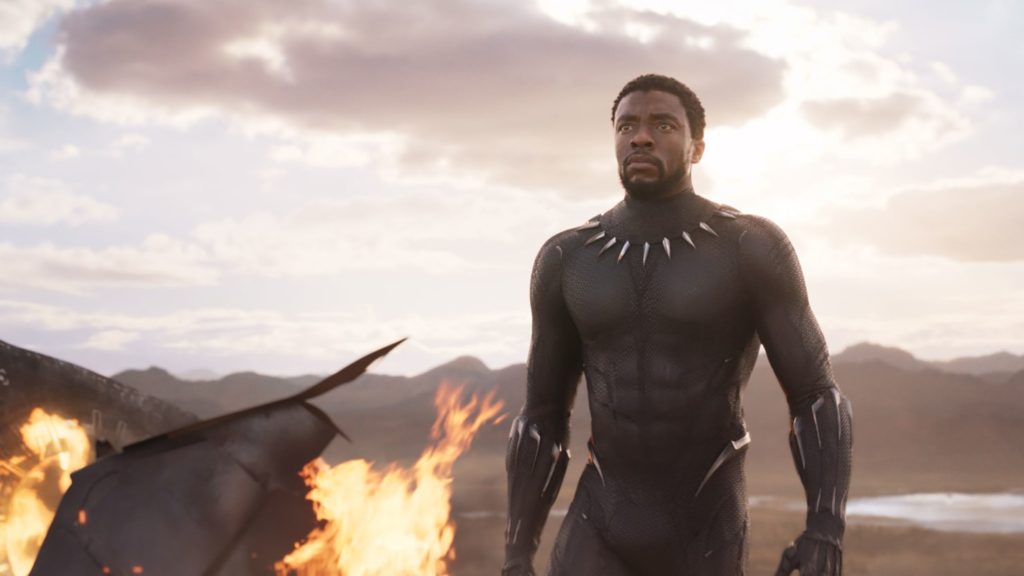

Dreamed up by Stan Lee and Jack Kirby, Black Panther was the first black superhero of any significance, debuting in Fantastic Four in 1966, and gradually taking over the pages of Marvel’s Jungle Action in the ’70s. He made his movie debut in 2016’s Captain America: Civil War, played, as he is here, by Chadwick Boseman.
The roll that Marvel movies have been on continues, and maybe reaches a high point, with this extravagant, stirring saga. The title character is T’Challa, a royal in Wakanda, a tiny, isolated African nation. He’s a rare (maybe singular?) specimen of both the Superman-Captain Marvel type of superhero, in that he has psuedo-scientifically and/or mystically bestowed superhuman powers, and the Doc Savage-Batman- James Bond school, in that he’s a rich kid with unlimited technological resources and official sanction.
Wakanda, you see, has a secret: to the outside world it looks like a bucolic third-world backwater, but the big mountains in its center are a projection masking a futuristic, technocratic civilization far in advance of the rest of the world. It’s powered by the deposits of an element called “vibranium” on which the country sits and which, along with training and traditional rituals, are also what give our hero his abilities.
The Wakandas keep their real nature secret to keep the vibranium from falling into the wrong hands, and to protect themselves and others from the corruption of interfering in other people’s affairs. They’re like Switzerland, or Star Trek’s Federation with its annoying “Prime Directive.”
Near the beginning of the film, we see a Wakandan airship cruise into the skyline of this utopia. At the screening, I was sitting next to an African-American friend who leaned over and whispered in my ear “Thanks for the help during slavery.” I must admit that, in all my readings of the comic, this potential for resentment of the Wakandans by other people of African descent, and by disadvantaged people in general, had simply never occurred to me. But it turns out to be the center of the movie’s conflict.
The story here involves two villains. Klaue, a tatted-up South African weapons peddler with a vibranium-powered mechanical arm and a grudge against T’Challa, is played by Andy Serkis, grinning with jolly murderousness. But in the course of the story he’s overtaken as antagonist by Killmonger (Michael B. Jordan), a veteran of the U.S. military with an even deeper and more complicated grudge against our hero.
Director Ryan Coogler, who co-wrote the script with Joe Robert Cole, nails nearly every element in Black Panther. The narrative unfolds conventionally, but with a precision and a steady pace that makes it feel mythic. The movie is unhurried, yet I can’t remember a boring moment, and the strength of the emotional payoff in the final minutes may sneak up on you. The costumes, sets and cinematography have a lush visual whimsicality—an affectionate hint of an old-Hollywood idea of Africa—that borders on the tongue-in-cheek but avoids kitsch.
Better than any of this, however, is the cast. Boseman plays iconic figures—Jackie Robinson, James Brown, Thurgood Marshall—so often that it’s easy to miss that
he plays them as human beings. His princely bearing as T’Challa is used, often and wisely, to comic effect. He’s a frequent straight man to the ridiculously glamorous women in the cast: Lupita Nyong’o as his spy love interest, Letitia Wright as his tech-genius little sister–equivalent to Q in the Bond flicks—Angela Basset as his mom, and Danai Gurira as the leader of Wakanda’s corps of shaven-headed warrior women.
Jordan, on the other hand, brings a touch of the tragic to his performance without milking it. Other cast members, like Forest Whittaker, Daniel Kaluuya, Winston Duke and Martin Freeman as a CIA man, bring warmth and individuality to what are, essentially, stock characters.
This movie perpetuates the Star Wars/ Lion King idea of royal bloodlines and birthrights being central to society. And it shares the same limitation as most superhero stories: Boiling its conflict down to a climactic fistfight. But within the context of these obligatory elements, this Black Panther is about as good as big- budget blockbuster moviemaking can be.

